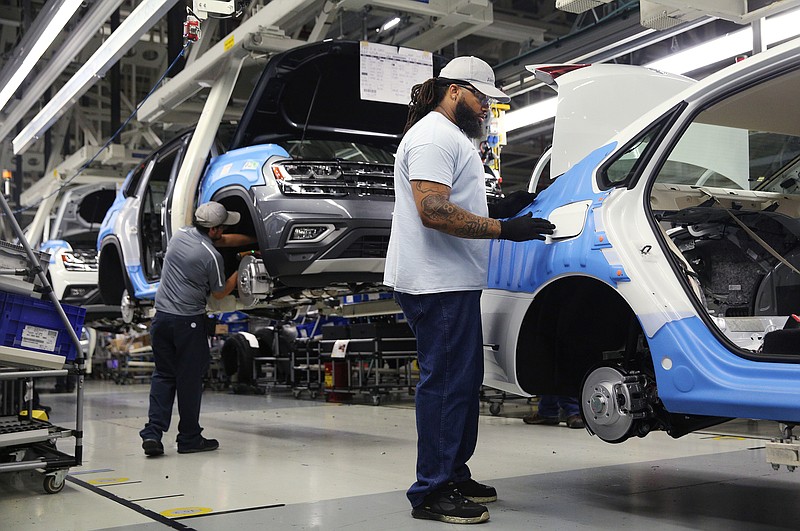That's something up to workers to decide - if it's a good investment in their future
Amid the flurry of pro- and anti-union charges and counter-charges over the Volkswagen Chattanooga vote, one issue that's not at the top of the list is money.
Health and safety, management-worker relations, the United Auto Workers itself and other non-monetary issues have often dominated discussions.
Kristin Dziczek, vice president of industry, labor and economics at the Center for Automotive Research (CAR) in Michigan, said she's not surprised.
Dziczek said a union organizing drive is a big endeavor, and if it's just about "a couple of bucks," it's hard to make a case for it.
"Often it's more about fairness in the workplace," she said, adding that job security, grievances and health and safety are top issues.
That said, if production and skilled trades workers vote in a union this week, people who join the UAW will be assessed union dues.
The UAW assesses 2.5 hours of straight time pay per month for hourly workers. The UAW's constitution requires two hours of dues to be disbursed to local unions and the remaining half hour of wages for dues to the International union's strike and defense fund.
Matt Sexton, a Volkswagen plant worker who supports the union effort, predicted he'd pay about $50 a month in dues.
"It would definitely be worth it," he said, citing what he termed an expected "change in philosophy" at the plant where about 1,700 workers are voting in the three-day election that ends Friday night.
Brian Rothenberg of UAW International said that if the union's strike fund reaches $850 million, the assessment goes down to 2 hours.
Because Tennessee is a right-to-work state, no VW worker would be required to join the union or pay dues.
Still, there's concern among some anti-union employees over the UAW's impact on job security at the VW plant.
Comekia Mikes, a nine-year plant worker, said she's worried that if the union is approved, staffing levels would be affected at the factory.
"That's my main concern," Mikes said. "If the UAW gets there, it will affect job security. The UAW would affect all of us."
Ahead of this week's vote, Volkswagen announced in March that production workers at the plant would see a pay boost starting July 1.
Permanent hourly employees would start at $16 per hour, up from $15.50 per hour. The 50-cent-per-hour raise is across the board, also hiking the pay for production workers already employed by the German automaker, according to VW.
The new rate calls for Chattanooga workers to be eligible to earn $17 per hour after six months of employment with VW. After two years, they're eligible for $19.70 an hour. New hires which begin at $16 per hour top out at $23.50, according to VW.
Under the UAW's 2015 contract with General Motors, which includes the production workers at the automaker's Spring Hill, Tennessee, plant, a two-tier pay system in effect since the 2008 recession was revised to bring newer, or so-called "in-progression" workers, up to "traditional" employee pay.
For example, an employee hired after September of last year would begin at $17 per hour and progress to $28 per hour by 2021, said Rothenberg. He said the GM contract is due to be reconsidered this fall.
Wages at VW and GM can be increased by add-ons such as bonus pay.
VW plant spokeswoman Amanda Plecas said that using its pay-for-performance bonus system, the average team member bonus for 2018 equaled $3,682. Team leaders received an average of $4,200 while skilled team leaders received $5,563, she said. Plecas said the bonus maximum amount was recently increased from 12.5 percent to 16 percent of eligible earnings.
"We believe this increased bonus system provides a better payout for our team members and provides multiple opportunities to earn a bonus regardless of company profit," she said.
At GM, the 2019 bonus was $1,000 per $1 billion of North American profit, which equaled an average of $10,750 for workers, according to the UAW. The GM bonus was the most generous of the Detroit 3 automakers with Ford paying $7,600 and Chrysler an average of $6,000.
Plecas said that in 2018, the average annual pay for VW production team members was $54,690. Skilled team members earned $78,258.38. According to the U.S. Bureau of Labor Statistics, the average annual wage for the Chattanooga area is $45,656, she said.
Rothenberg said that based on a $28 per hour wage rate and working 2,000 hours annually, GM employees earn on average $79,750 including profit-sharing and bonuses. That figure doesn't include retirement contributions, he said.
Rothenberg said that if the union wins the election, it will begin bargaining talks with VW over pay, bonuses and a variety of other topics.
Karl Brauer, executive publisher of Kelley Blue Book, said that under a union contract, if pay goes up, union dues can cut into wages.
"It's more complex for individuals to get raises after that based on individual performance," he said, adding that it's tied to the union contract. "As you unionize the plant, they lose control over their destiny."
Dziczek of CAR in Ann Arbor, Michigan said the cost-benefit analysis of union dues depends on what a person earns along with his or her benefits.
"That's something up to workers to decide - if it's a good investment in their future," she said. "That's what is at stake here."
Contact Mike Pare at mpare@timesfreepress.com or 423-757-6318. Follow him on Twitter @MikePareTFP.
